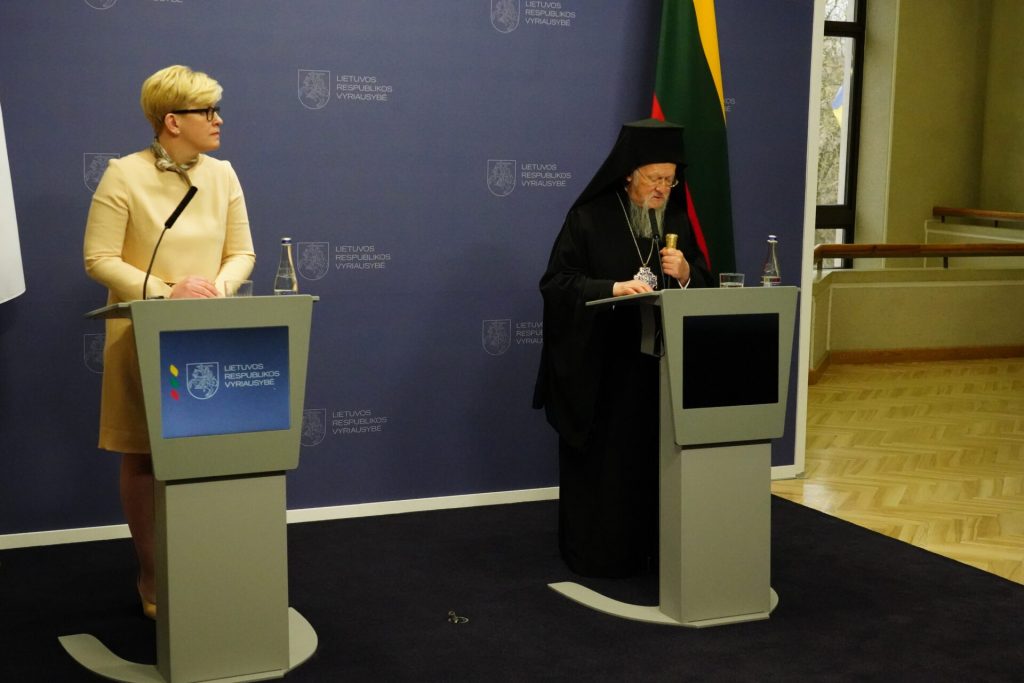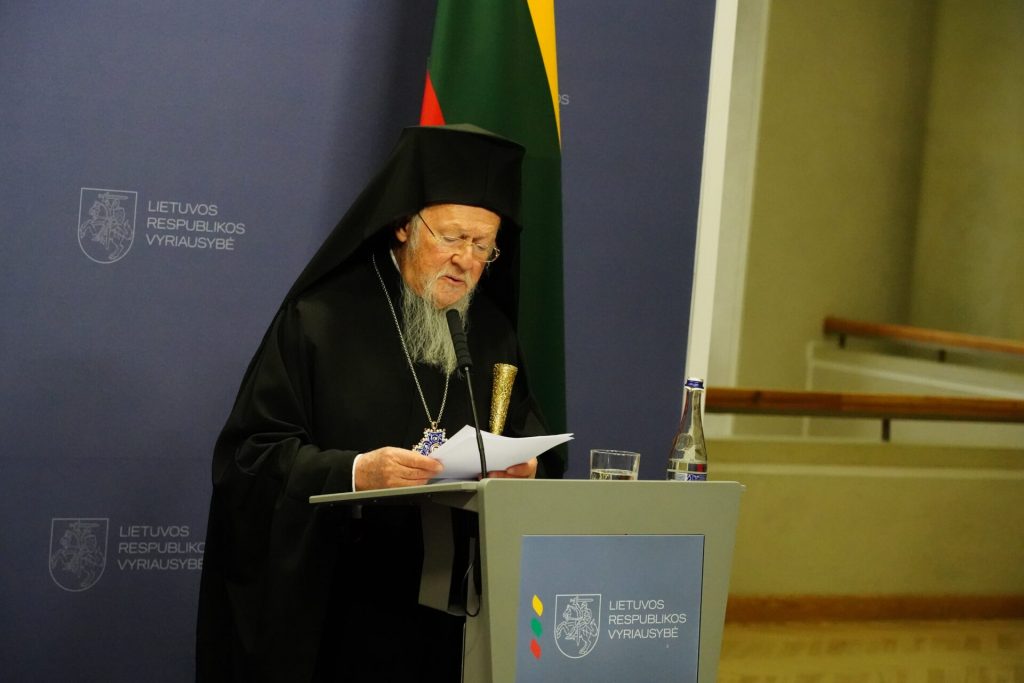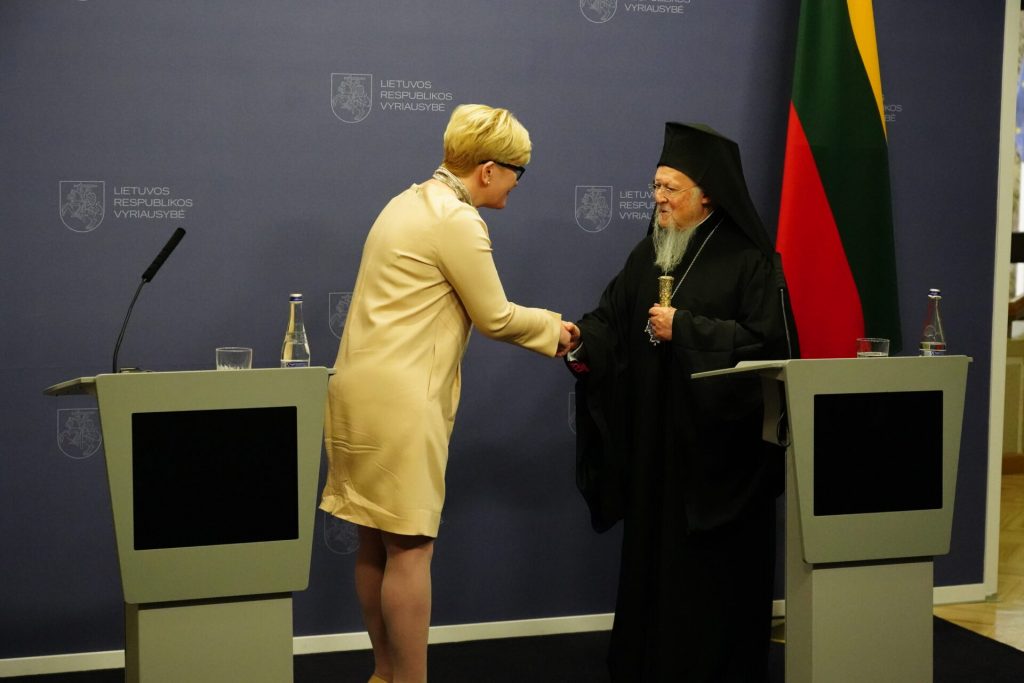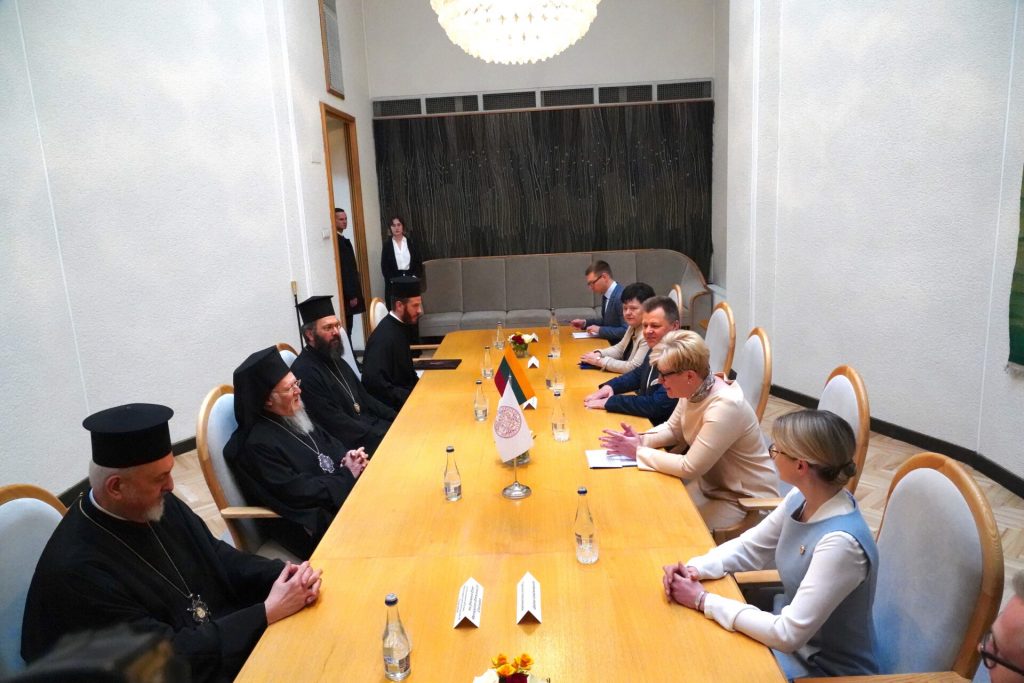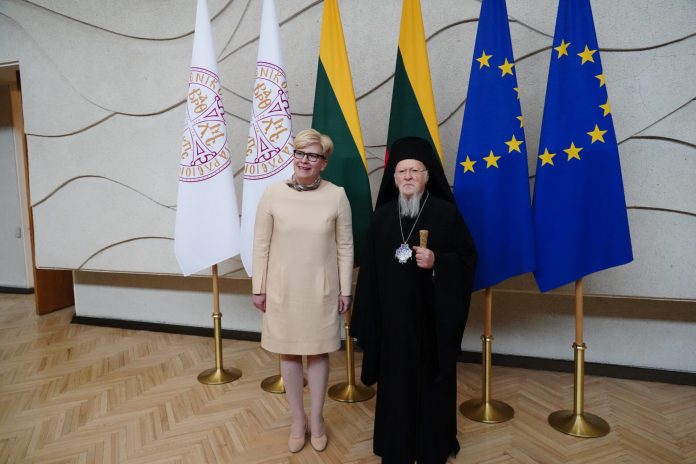His All-Holiness Ecumenical Patriarch Bartholomew STATEMENT after the meeting with the Prime Minister of Lithuania HE Ms Ingrida Šimonytė and the Signing of the Agreement of Cooperation (Vilnius, March 21, 2023)
We are indeed very glad to be able to pay this first official visit to your beautiful country upon the kind invitation of the honorable government of the Republic of Lithuania. We are personally grateful to Her Excellency Ms Ingrida Šimonytė for welcoming us and our entourage at the Government Palace and for our cordial and fruitful meeting.
We are visiting this hospitable country for the first time to strengthen the bonds between the Ecumenical Patriarchate and the Republic of Lithuania. Together with the Prime Minister, we just signed an Agreement of Cooperation that stipulates and encourages closer ties and collaboration in various fields of common interest. As mentioned clearly in the text of the Agreement, the presence of Orthodoxy in Lithuania dates back to the 13th century. This centuries-old relationship between the Orthodox faithful of your country and the Ecumenical Patriarchate bears testimony to the fact that this is not the first contact between the land of Lithuania and the Mother Church of Constantinople. Today a new perspective opens before us along with the possibility to work together for the establishment of the Exarchate of the Ecumenical Patriarchate in Lithuania.
This is also the will of Orthodox priests and faithful in your country. As mentioned in the Agreement of Cooperation, we support the aspirations of both the group of Lithuanian Orthodox priests and believers representing various other ethnic communities in Lithuania to follow their conscience and to restore historical justice by practicing their faith in a church under the jurisdiction of the Ecumenical Patriarchate. Mindful of and fully committed to the freedom of conscience and religion enshrined in the Constitution of the Republic of Lithuania, in the Universal Declaration of Human Rights, but also in the Encyclical of the Holy and Great Council of the Orthodox Church (Crete, 2016), we fully support the right of the Lithuanian Orthodox believers to worship freely and in conformity with their conscience.
As the 2016 Holy and Great Council of the Orthodox Church declared: “No one has honored man and cared for him as much as the God-man Christ and his Church. A fundamental human right is the protection of the principle of religious freedom in all its aspects–namely, the freedom of conscience, belief, and religion, including, alone and in community, in private and in public, the right to freedom of worship and practice, the right to manifest one’s religion, as well as the right of religious communities to religious education and to the full function and exercise of their religious duties” (Encyclical, paragraph 16). The Council also called for constructive synergy and earnest cooperation between Church and State “in order to preserve man’s unique dignity and the human rights which flow therefrom, and in order to assure social justice” (ibid).
Indeed, cooperation between a State and religious organizations can bring significant benefits to society. The United Nations recognizes the role that religious institutions can play in promoting peace, tolerance, and understanding among different communities. In fact, the UN has actively engaged with religious leaders and organizations to address various social, political, and economic issues.
One of the key benefits of such a cooperation is that it can lead to a more cohesive and harmonious society. Religious organizations play a significantly influential role on the moral and ethical values of their followers, and they can work together with the government to propagate these values in society. This can lead to the reduction of social conflict and to deeper solidarity.
The UN has also recognized the crucial contribution of religious organizations to the advancement of sustainable development. For example, religious institutions can be powerful advocates for environmental protection and can work with the government to cultivate sustainable practices in their communities.
The Bible, too, emphasizes the importance of cooperation and peace between different communities. In the book of Isaiah, it is stated that God “will judge between the nations and will settle disputes for many peoples. They will beat their swords into plowshares and their spears into pruning hooks. Nation will not take up sword against nation, nor will they train for war anymore” (Isaiah 2:4). Similarly, in the New Testament, Jesus declares, “Blessed are the peacemakers, for they will be called children of God” (Matthew 5:9). This verse emphasizes the importance of working for peace and reconciliation between different groups.
The Bible also teaches that love and peaceful co-existence among people are the keys to a fulfilling and Godly life. In fact, one of the greatest Scriptural commandments is to “love your neighbor as yourself” (Mark 12:31). Similarly, St. John writes, “Whoever does not love does not know God, because God is love” (1 John 4:8). These passages remind us that our love for others is a reflection of our love for God, and that we cannot truly know Him without first demonstrating love and compassion towards our fellow human-beings.
In this spirit, the Ecumenical Patriarchate has launched a number of initiatives to mobilize people around the world to take action on these issues. One of the principal concerns for the Church of Constantinople has been to foster peace and reconciliation between different religious and ethnic groups. We have been a vocal advocate for inter-Christian and interfaith dialogue and we have worked tirelessly to build bridges between different communities. We also strongly support efforts to promote social justice and human rights, including the rights of refugees and other vulnerable populations.
In addition to promoting peace, the Ecumenical Patriarchate has also been a pioneer and a leader in the global movement to protect the environment. We have repeatedly spoken out about the urgent need to address climate change and we have launched a number of initiatives to raise awareness about this issue.
One of our most notable actions has been the establishment of September 1st as day dedicated to prayers for the protection of creation. This decision of the Ecumenical Patriarchate inspired our beloved brother Pope Francis to also announce the same day as a Catholic World Day of Prayer for the Care of Creation, followed by the Anglican Communion and other Christian denominations and ecumenical organizations, such as the WCC and CEC. Therefore, this initiative of the Church of Constantinople has turned into a source of unity for Christians around the world in defence of our oikos, our common home.
In a similar way, with the Agreement signed here today, the Ecumenical Patriarchate sacrificially offers itself to the service of the Orthodox faithful in your country by extending its spiritual presence in Lithuania along with the unique responsibilities entrusted to us by the Holy and Sacred Canons and the sanctified longstanding practice of the Eastern Orthodox Church. This is an exceptional honor for us, and we are, therefore, particularly grateful to the Prime Minister and the government of Lithuania for their support.
As we approach the celebration of the Great Feast of Easter, we wholeheartedly offer to all of you our Patriarchal benediction and paternal prayers. May the Lord always keep you and your families and grant to the blessed land of Lithuania a happy and prosperous future! Amen!
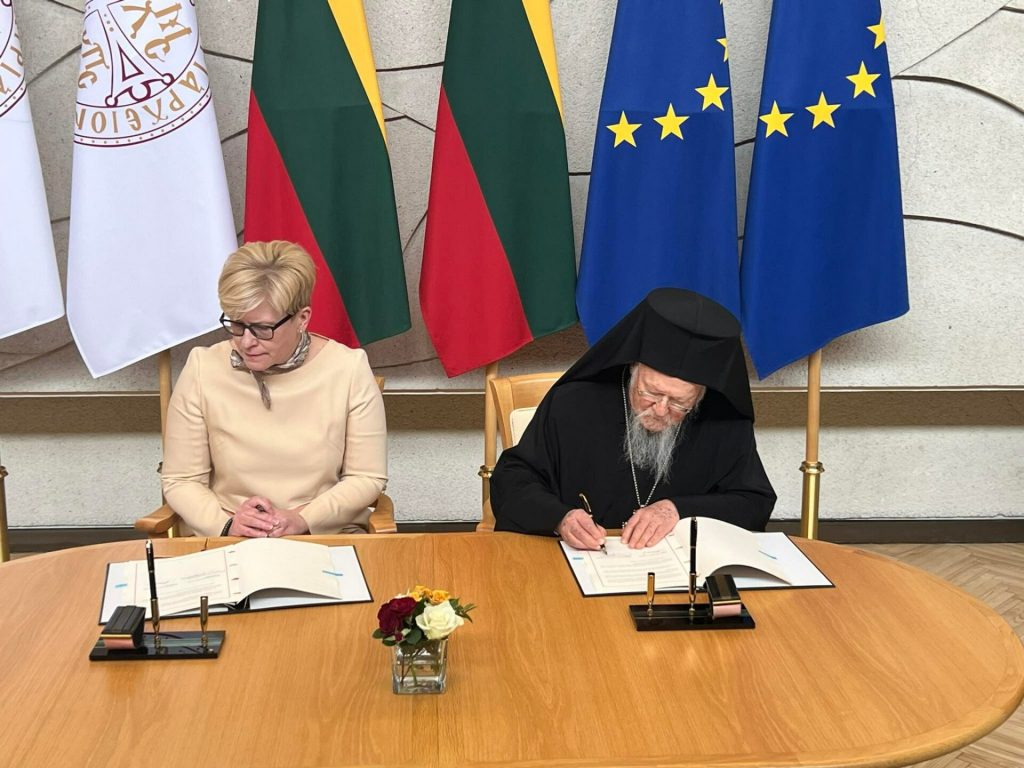
Unofficial English translation of the statement by the Prime Minister of Lithuania HE Ms Ingrida Šimonytė
Let me greet His Holiness Ecumenical Patriarch Bartholomew on his first – and I hope not his last – visit to Lithuania. Your Holiness, thank you for accepting my invitation. This visit of yours is undoubtedly historic.
Today I had the opportunity to personally thank His Holiness for his attention to the situation of the Orthodox Church in Lithuania.
Throughout its history, Lithuania has been, is and I believe will always remain an open and tolerant country for people of all faiths and goodwill. Eastern Orthodoxy is the second most numerous traditional religion in Lithuania and an important part of Lithuanian history and culture.
Since the 13th century, the Orthodox who lived in Lithuania were part of the Orthodox Metropolis of Kyiv, under the Patriarch of Constantinople, and rightly considered Constantinople as the Mother Church, because this is the source of their religion. It was only at the end of the 17th century, when the Patriarch of Moscow, after having acquired the right only to ordain the elected Metropolitan of Kyiv, [according to the best imperial traditions] decided to take full possession of the Orthodox Metropolis of Kyiv, and with it, the Lithuanian Orthodox.
It is natural and human that with Russia’s full-scale aggression against Ukraine, and with Patriarch Kirill of Moscow openly supporting it, it has become impossible for some Orthodox living in Lithuania to be part of the Vilnius and Lithuanian Archdiocese of the Patriarchate of Moscow without a conflict of consciences.
This concerns not only Lithuanian citizens, including those of Greek or Ukrainian origin, but also about the tens of thousands of Ukrainians who were forced to flee the war and who have found a temporary – or, in some cases, permanent – home in Lithuania. It also concerns the still growing community of Belarusians in Lithuania who fled repression and continue fighting for freedom and democracy.
It is therefore quite understandable, and historically justified, that in order to confess their faith without a conflict of conscience, representatives of national communities addressed His All-Holiness Patriarch Bartholomew for admission to the Mother Church of Constantinople.
Therefore I, both personally and on behalf of the Government, supported the request of the representatives of the national communities and the Orthodox priests who later joined them to His Holiness. I would like to stress that the decision on the return of the Ecumenical Patriarchate to Lithuania can only be taken by the Ecumenical Patriarchate itself – this is a matter for the Church and the faithful. Today I have reassured His Holiness – and I would like to reiterate to all Orthodox Christians in Lithuania, without exception – that my Government will do its utmost to protect and guarantee the freedom of faith, conscience and religion, as enshrined in the Constitution of the Republic of Lithuania, for each and every citizen and resident of Lithuania.
The State and its officials may not interfere or try to influence the canonical decisions of churches. However, when they are made, it would be hypocritical to pretend that we do not understand or appreciate their importance.
The decision of the Ecumenical Patriarchate of February 17 to uphold the appeal of the five Orthodox priests who had been expelled from the clergy by the decision of Patriarch Kirill of Moscow, to restore their religious status and to admit them to the Ecumenical Patriarchate, is an important step towards religious freedom in Lithuania.
This decision of the Ecumenical Patriarchate restores justice to five Lithuanian citizens and gives much needed hope to the Orthodox Christians in Lithuania, who do not and should not be forced to choose between their faith and their beliefs.
Today we have taken another important step. We have signed an agreement on cooperation between the Government of the Republic of Lithuania and the Ecumenical Patriarchate. I hope that this will be a solid foundation to strengthen our relations and for the Patriarchate of Constantinople to re-establish its religious community in Lithuania.
Photos: Nikos Papachristou / Ecumenical Patriarchate
